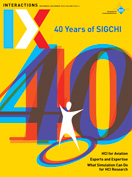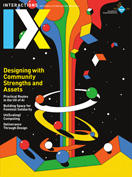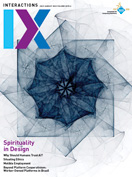Authors:
Syed Ishtiaque Ahmed
Values and ethics have long been central to many discourses in HCI. But these topics have received an additional impetus in the past decade, with the rapid advancement of artificial intelligence technologies worldwide and the concerns that they have engendered. Scholars have demonstrated how many of the "data-driven" systems that AI uses are unethically using people's personal data, delivering biased outputs, and/or damaging our environment, to mention just a few of the harms. Such data-driven AI algorithms and systems are often criticized for being racist and sexist, or perpetuating colonial or exploitative conditions. Contemporary scholarship is hence critical of AI's treatment of individual privacy and trust, as well as of how such AI systems are biased against certain groups. Many AI and HCI researchers are focusing on designing and developing AI systems that are fairer, more trustworthy, and more accountable—all of this is based on a particular understanding of ethics that defines what is good and what is not. Thus, this growing body of work in HCI and related fields has brought the ethics question to the center of our attention once again.
→ Most of today's ethics discussion in HCI is based on a Western secular ethics that does not represent the moral values of many people.
→ Postsecular HCI invites us to challenge such ethical universalization.
→ A pluriversal understanding of ethics is needed to decolonize ethics in HCI.
What is asked less in such ethical discussions is, "Whose ethics are we talking about?" The idea of ethics is neither unique, nor is it uncontested in history. However, in the Western world, most contemporary ideas of ethics are shaped by the thoughts of early European thinkers, such as Immanuel Kant, John Locke, Karl Marx, Jean-Jacques Rousseau, Jeremy Bentham, and John Stuart Mill, as well as 20th-century philosophers like Jürgen Habermas, Michel Foucault, John Dewey, Richard Rorty, and John Rawls. These scholars' writings often serve as the basis of ethics that people deploy in creating, installing, and practicing technologies, laws, and policies. Analyses and criticisms of technologies, political decisions, public policies, and actions taken by private institutions and individuals are also based on the works of these and similar thinkers. Despite several major disagreements, an essential characteristic of the works of these thinkers is that they allow us to think about ethics through logic or reason, often void of the idea of faith and God. While some of these scholars do root their arguments in religious faith, that is often ignored; an overarching idea of secularism has captured the mainstream discussion on ethics in the West. It should be noted here that many communities in the West are religious, and their ideas of ethics are not always aligned with secularism. Such faiths and beliefs are reserved for the private sphere, however, and kept separate from broader public affairs. And yet, the official motto of the United States of America remains "In God we trust."
The secular characteristics of Western secularism are also questionable. Cultural anthropologist Talal Asad, referring to Habermas's work, has shown how the so-called secularism in the West is rooted in Judeo-Christian heritage [1]. Much of what we know as good and bad through Western secular ethics is shaped by the early teachings of ethics in the Old Testament and Bible. Establishing these teachings as the universal pillars of secular ethics required European men to replace God with themselves. Decolonial scholar Enrique Dussel has explained this process, showing how Rene Descartes's famous "I think, therefore I am" essentially replaces God with "I"—a human being, who is also male, European, modern, scientific, and rational. Dussel's work traces the root of this secularization of Judeo-Christian ethics in the crusades between European Christians and non-European Muslims, where the former had an agenda of criticizing Muslim ethics from a "neutral" perspective. He demonstrates how this epistemic position inspired European Christians to develop "secular" ethics that are often anti-Muslim in nature, but were packaged and globalized in the name of secularism [2]. Dussel shows how this ethical imposition helped the Europeans establish a large colonial empire over the knowledge systems of the colonized communities across history.
One of the negative consequences of the anti-Muslim sentiment in Western secularism, which is also influenced by various problematic narratives of many heinous crimes and terrorist activities around the world, is Islamophobia: a strong hatred of Islam and Muslims, which is widely prevalent in many Western countries. Islam and Muslim ethics are often considered outdated, barbaric, inhuman, homophobic, and terrorizing in the West. As a continuation of such biased attitudes toward Islam, and with the escalation of the U.S. relationship with some Islamic countries, Muslims are often treated as potential terrorists. Queer theorist Jasbir Puar, in her trailblazing book Terrorist Assemblages, shows how American essentialism has made Islam, Muslims, and Islamic practices symbols of terrorism [3]. Her work explains why and how the hijab is labeled as a symbol of oppression, Muslim names are suspected of potential terrorism, and people from certain Muslim countries experience various restrictions in the West. Taken together, it is obvious that Western "secularism" is questionable and does not treat everyone equally.
In the past five years, my research group of students and collaborators has been studying various kinds of oppression and discrimination involving computing technologies rooted in the practices ofWestern secular ethics. This led us toward the idea of "postsecular HCI." According to Wikipedia, postsecularism refers to a range of theories regarding the persistence or resurgence of religious beliefs or practices in the present. Similarly, we define postsecular HCI as a lens through which to conceptualize, analyze, criticize, and design in response to an ethical practice that either ignores the presence and importance of religion, faith, beliefs, and spirituality, or introduces biased treatment toward people based on their faith.
Yasaman Rohanifar, a Ph.D. researcher in our group, has been leading a study that examines how ethics is conceptualized and practiced in financial technologies. Her investigation reveals how money-transferring services like PayPal and Western Union have imposed restrictions on sending or receiving money to and from Iran, Palestine, Syria, and many other Muslim countries, and how those restrictions have made the lives of the immigrants from those countries difficult in the West [4]. Her follow-up work in Bangladesh demonstrates how international money transferring is difficult for Bangladeshis, as they are often suspected of financing terrorism. She further shows how many ATMs require users to remove head coverings, making them unusable for many practicing Muslims. Rohanifar brings to the fore an important limitation of embedding Western secular ethics in computing, especially when the corresponding service involves a country outside the West that does not necessarily share the same understanding of ethics. While a part of this problem might be explained by the political relationship between a non-Western country and a powerful country in the West (and hence one might find the whole problem similar to the U.S.'s financial embargo on Cuba), many restrictions, security checks, and surveillance mechanisms over West-based financial technologies are particularly hard for Muslim nations. Therefore, if we are to address the issue of discrimination over computing platforms in a global context where different communities participate, we should not confine ourselves within Western secular ethics, and we should think about ethics in a broader, more pluralistic manner.
Today's computing is not equally accessible for many faith-based communities around the world. Mohammad Rashidujjaman Rifat, another Ph.D. researcher in our group, has been studying the use of computing technologies among practicing Muslim communities in Bangladesh for the past four years. His work demonstrates how members of these communities are often hesitant to use Facebook and similar social media, as they might see something in their news feed that they are not allowed to see. While the uncertainty of what will come next might be a matter of excitement for many (and hence might be considered a good design choice by social media companies), the participants of our study wanted to be certain that they would not see anything inappropriate. The Internet is often risky and harmful for them, as it contains millions of pornographic images and videos—a concern that, in itself, might not be a serious issue in secular ethics. Rifat's work also reveals how the rationales for "sustainability" in pious Muslim communities are different from the scientific and economic rationales often practiced in "sustainable HCI" [5]. He shows how persuasion can be thought of beyond its microeconomic cognitive models that once were popular in HCI, and could actually be beneficial for many people in faith-based communities. This line of work demonstrates how the idea of right and wrong differs among different faith-based communities, and how taking God out of the ethics discussion essentially silences their voices.
We should think about ethics in a broader, more pluralistic manner.
The practices of Western secular ethics not only discriminate against the followers of organized religions like Islam but also suppress many faith-based traditional practices. Sharifa Sultana, a Ph.D. candidate at Cornell's Information Science Department and a Facebook fellow, is a long-term collaborator with our research group. She has been studying the relationship between computing and faith-based practices in rural Bangladesh. Sultana's ethnography on rural witchcraft reveals how scientific rationales and the modern conceptualization of health are neither suitable nor enough for many villagers [6]. For example, the villagers argue that modern medical science can heal a hand if it is broken but cannot explain why the patient broke their hand in the first place. On the other hand, witchcraft explains how a diversion from morality results in such a misfortune, and thus connects a person's health with their society and environment. This helped us understand how faith defines the role and impact of science and technology in rural life. Sultana's follow-up work on betting practices among the villagers also shows how dominant practices in many machine-learning algorithms to predict the future based on past data are often not accepted in rural communities according to their local lore and ethics. Instead, they believe that only God can control the future, and hence, instead of doing math on past data, they pray to their gods and try to lead what they believe is a moral life to get God's blessings. It is important therefore to note how God and/or supernatural powers work as a unifying force that connects people's health and minds with nature and community. Dussel argues that Western liberal philosophy divorces us from such unifying knowledge and ethics by separating mind from body, and by dividing people into individual units. Modern computing technologies that often carry the values of such Western scientific rationales work poorly in the rural areas in the Global South where people believe in supernatural powers.
Beyond the specific studies we have been involved in, we realize we need to be careful in addressing this postsecular agenda in HCI. Many arguments that come from this perspective might be categorized only as a response to the discrimination against faith-based communities. In this light, faith-based communities are merely another "category" of people who are subject to systematic discrimination advanced by computing technologies; hence, they join a long list of such communities including women, people of color, people living outside the Western world, people in LGBTQ+ communities, First Nations, and people with disabilities, among others. Looking at postsecular HCI from this perspective may still be useful in revealing various avenues of discrimination and combating anti-Semitism, Islamophobia, and hatred toward other faith-based communities. This conceptualization may also encourage the design and development of technologies that address the unique needs of different faith-based communities, and thus serve millions of people in the world. So, from this perspective, postsecular HCI is a movement making computing more equal, accessible, and useful for faith-based communities.
However, postsecular HCI also has a broader agenda that goes beyond this "equal treatment." The ideas of equity and fairness that are used to evaluate and justify the actions of a system, algorithm, law, and/or policy can be examined through this lens of postsecular HCI by asking, "Whose ethics are we using to analyze this?" Instead of taking an ethical perspective uncritically, postsecular HCI invites us to situate it in its historical and political contexts. It criticizes universalizing any ethical standard through computing. As we have seen in the previous examples, ethics is often a debated concept, and imposing a foreign ethics on a community has its roots in colonialism. Postsecular HCI shares the spirit with the growing work focused on postcolonial/decolonial computing in HCI, and invites us to decenter the ethical discourse from a West-centric secular analysis to a pluriversal discussion on ethics. This decentering will not only enrich the criticisms and create novel directions of thinking but also help advance the movement of ethical computing beyond the West.
I will end this discussion by making two more points. First, in today's world, we are observing many tensions and conflicts that are rooted in the differences in how people think about ethics. While a rich body of HCI work has correctly called for situating values and ethics in the local context, there is still a gap in the literature to address the conflicts between competing ethics within or between communities. For example, much of today's debate on the moderation of social media contents boils down to the question of how we negotiate between two groups with different and competing faiths and/ or ideologies. I argue that the right approach to this problem is not to look outside faith, but rather to look into it, and build on the rich body of work on theology, interfaith dialogues, and religious studies. Second, postsecular HCI does not mean an absolute relativist position about ethics, which would allow an uncritical treatment of an action justified by someone's chosen faith. In fact, postsecular HCI will challenge such an imposition and will analyze an action from a wide range of ethical perspectives to make the judgment. This is where the call for postsecular HCI is essentially a call for advancing our understanding and improving our practice of ethics in HCI.
1. Asad, T. Formations of the Secular. Stanford Univ. Press, 2020.
2. Dussel, E. Beyond Eurocentrism: The world-system and the limits of modernity. In The Cultures of Globalization. Duke Univ. Press, 1998. 3–31.
3. Puar, J.K. Terrorist Assemblages. Duke Univ. Press, 2018.
4. Rohanifar, Y. et al. Money whispers: Informality, international politics, and immigration in transnational finance. Proc. of the 2021 CHI Conference on Human Factors in Computing Systems. ACM, New York, 2021.
5. Rashidujjaman, R.M., Toriq, T., and Ahmed, S.I. Religion and sustainability: Lessons of sustainable computing from Islamic religious communities. Proc. of the ACM on Human-Computer Interaction 4, CSCW2 (2020), 1–32.
6. Sultana, S. and Ahmed, S.I. Witchcraft and HCI: Morality, modernity, and postcolonial computing in rural Bangladesh. Proc. of the 2019 CHI Conference on Human Factors in Computing Systems. ACM, New York, 2019.
Syed Ishtiaque Ahmed is an assistant professor of computer science at the University of Toronto. For the past 12 years, he has been conducting ethnography and design research with various marginalized groups in the Global South. [email protected]
Copyright held by author. Publication rights licensed to ACM.
The Digital Library is published by the Association for Computing Machinery. Copyright © 2022 ACM, Inc.







Post Comment
No Comments Found